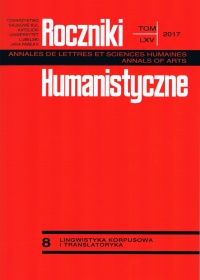A Few Remarks on French Lexemes Containing a Volitional Component
Abstract
The article deals with the question of whether the synonymy can be used to identify all lexical units with a volitional component. We arrive at the conclusion that we cannot detect the items constituting the nucleus of this semantic field without resorting to an analysis in terms of predicates and arguments. A particular emphasis is placed on the differentiating parameters between the lexemes constituting the core of the lexical field of words expressing will.
References
Bogacki Krzysztof & Karolak Stanisław, 1991, Fondements d’une grammaire à base sémantique. [in :] Lingua e Stile, 26(3), 309-345.
(DSSVF) Bogacki Krzysztof, Lewicka Halina et all., 1981, Dictionnaire sémantique et syntaxique des verbes français, Warszawa : PWN.
Danielewiczowa Magdalena, 2002, Wiedza i niewiedza. Studium polskich czasowników epistemicznych, Warszawa: KLF.
Descartes René, 1647, Les principes de la philosophie. Traduction française de l’abbé Picot, Paris.
Godart Elsa, 2011, La volonté inconsciente : La question d’une volonté sans sujet. Thèse de doctorat, Université de Strasbourg.
Gugała Marta, 2011, Wybrane polskie czasowniki i konstrukcje analityczne oznaczające stany woli. Analiza semantyczno-pragmatyczna. Thèse de doctorat non publiée.
Perz Magdalena, sous presse, « Le rôle du co-texte dans l’antonymie adjectivale » [in :] Neophilologica.
Spinoza Baruch, 1913, Ethique démontrée suivant l’ordre géométrique et divisée en cinq parties. trad. Ch. Auppuhn, Paris : Garnier Frères.
Thonnard François-Joseph, 1965, « Notion de concupiscence chez Augustin » [in :] Recherches augustiniennes III, 59-105.
Wierzbicka Anna, 1972, Semantic Primitives, Frankfurt am Main : Athenäum Verlag.
Copyright (c) 2017 Roczniki Humanistyczne

This work is licensed under a Creative Commons Attribution-NonCommercial-NoDerivatives 4.0 International License.





